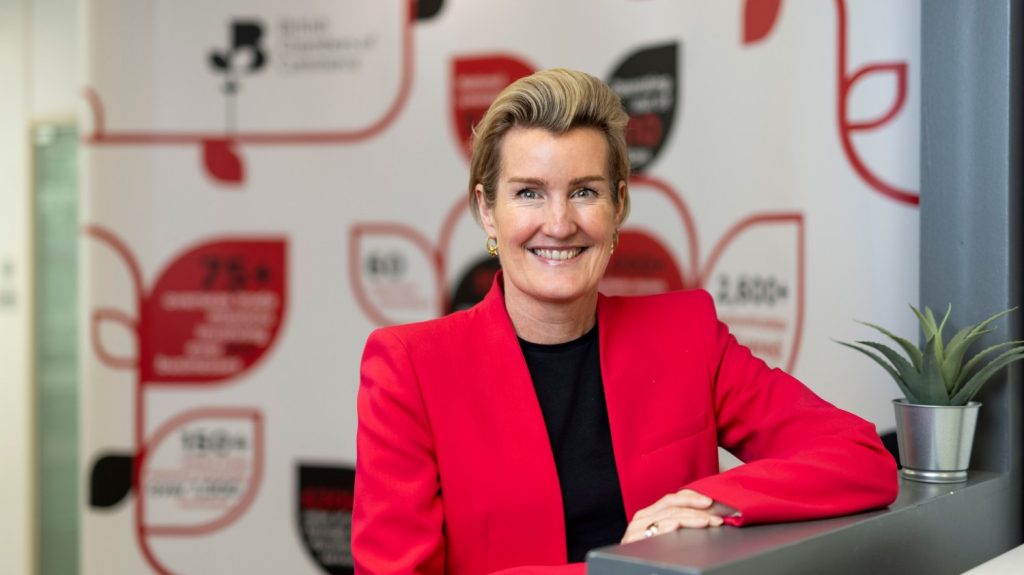Shevaun Haviland calls for “real partnership” on tackling trading barriers with EU, reforming the planning system and overhauling skills policy

Shevaun Haviland is expected to use her speech at the British Chambers of Commerce annual conference on Thursday to plead for a “real partnership” with the next government that creates the “right environment” for companies to grow.
Motherhood and apple pie? Perhaps, but following an era that has taken in five prime ministers since 2010 — one of whom allegedly said “f*** business” during the row over Brexit, and another who barely lasted a month — a plea for more stability with policymakers is understandable.
Haviland, director-general of the chambers, is careful not to make public assumptions about the likelihood of a Labour government but says it’s time for a “reset”.
“We’ve worked with the current government — they have listened. But it’s been difficult for us when your counterpart is constantly changing.”
The chambers is one of the “B5” elite of business lobby organisations, along with the CBI, the Federation of Small Businesses, Make UK and the Institute of Directors, who regularly hold meetings with secretaries of state.
It is best known for its network of 52 chambers in the UK and 80 overseas, which, among other things, help companies wanting to expand overseas meet trading partners and understand exporting paperwork.
Haviland, 52, says she’s not surprised by the absence of Brexit as a topic during the election campaign, but is hoping for a sensible conversation about tackling trading barriers once the next government is formed.
Since the trade agreement was signed between the European Union and UK in December 2020, a “lot of the country hasn’t wanted to talk” about the consequences of Brexit, she said.
However, she said about 60 per cent of members with international trade connections were “still finding challenges with getting their heads around the rules and trading with the EU”.
“We expected people to find it difficult at first but considered they’d be used to it by now. They’re not. Because the rules keep changing.”
Labour has made vague noises about a closer relationship with Europe, but has ruled out rejoining the single market or the customs union.
“What we want to see from the new government is a sort of pragmatic view of fixing some of the biggest challenges for business that are still outstanding from the [trade deal],” Haviland says.
“We’re not talking about looking backwards, about renegotiating or rejoining the EU — we’re talking about pragmatic, forward-looking solutions for business. More trade means more growth, more money to fund public services.”
Examples include food and drink rules, such as veterinary checks, she says. “If you are moving a pallet of mixed food products, you have to have a different piece of paperwork for all of them and if one of them is wrong, nothing moves.”
She also highlights VAT rules — where, she says, the UK has a less favourable regime than Norway enjoys with the EU. “If you’re a small business, you have to set up VAT on the continent wherever you’re exporting to. A lot of small businesses have decided not to do it any more.”
Mutual recognition of qualifications and easier movement of staff would be a win for services companies, she adds. “Those are some of the pragmatic things we want to see changed as soon as possible with any new government.”
Haviland will make her case at the QEII Centre in Westminster, where the conference is also due to hear speeches from Kemi Badenoch, the business secretary, and her opposite number, Labour’s Jonathan Reynolds, as well as Nicola Mendelsohn, head of global business group at Meta, owner of Facebook and Instagram, and Amanda Blanc, chief executive of Aviva.
Other issues on the agenda for the next government should be planning reform, an overhaul of skills policy and help for smaller companies to get to grips with the risks and opportunities of artificial intelligence, Haviland says.
While Labour has faced criticism from some parts of industry over its plans to change the tax treatment of private equity profits, Haviland says she’s more concerned about holding the next government to promises to overhaul business rates.
Successive governments have promised reform of the commercial property tax, which is widely seen as outdated and as unfairly punishing traditional retailers and other businesses that need properties close to town and city centres. Such promises have proved empty, perhaps because the tax is easy to collect, hard to avoid and brings in significant revenues. “Business rates is probably top of the list for our members. That covers a huge number of sectors, not just retail and hospitality. It is stunting growth.”
Not that the Chambers claims to have an easy solution. “The reason that it’s been slightly avoided is because it is difficult. It’s not for us to come up with the answer: there are a lot of very clever people in government in the Treasury.”
Neither of the two main parties’ manifestos set out a particularly ambitious programme for business and the economy, in fiscal terms at least, but Haviland says the combination of greater stability and reform in areas such as planning could free up industry to improve on more than a decade of national underperformance on everything from GDP growth to productivity, real wage growth, business investment and labour force participation.
“We are ready to help, to have a long-term partnership. The only way out of this challenge is economic growth.
“Businesses are saying, ‘We’ve got billions to invest in this country that we can’t get away. If you build out policy frameworks, we will come in behind and invest’. Let businesses do what they do best.”
Source from The Times
Original News HERE
































